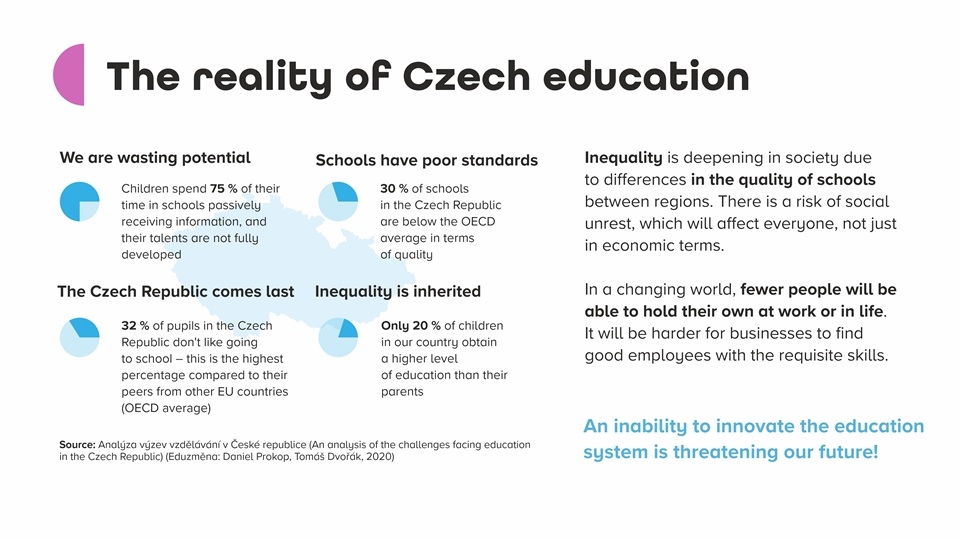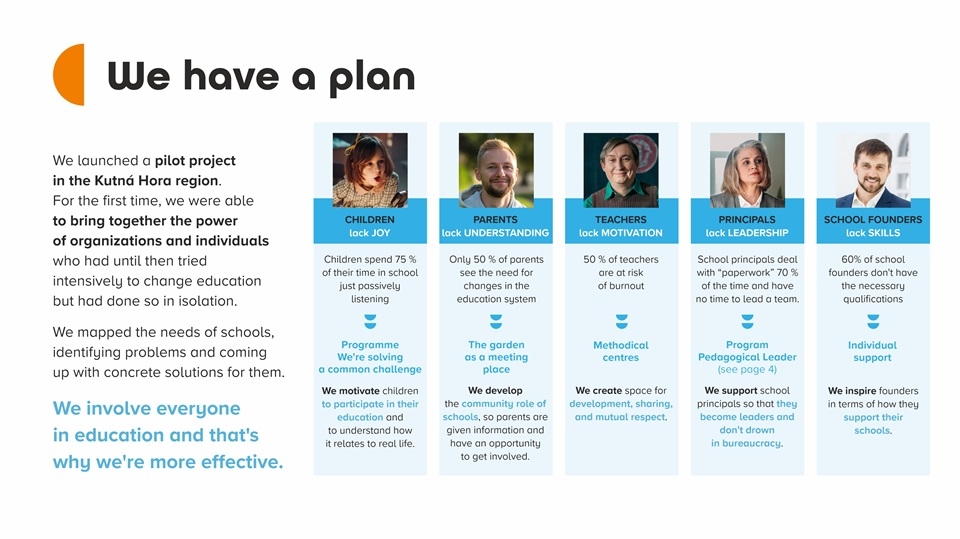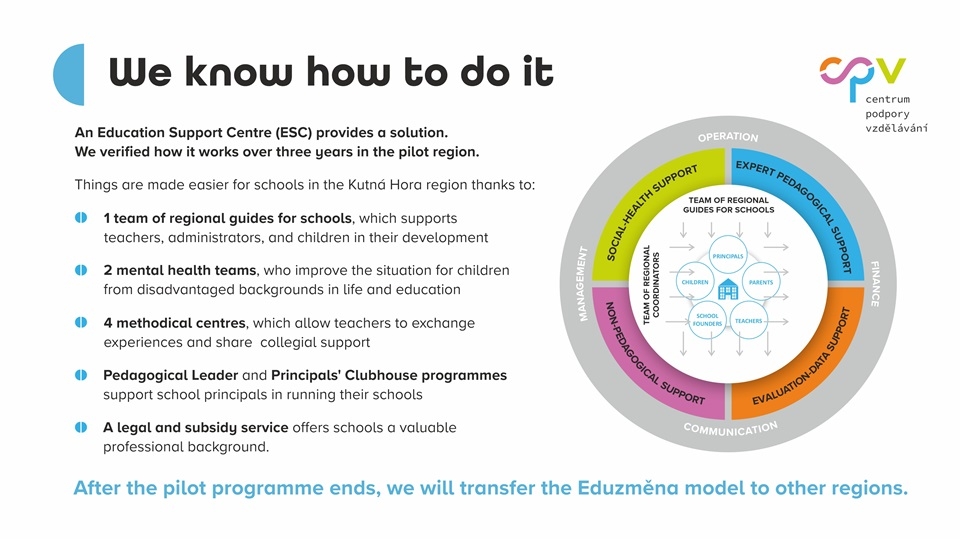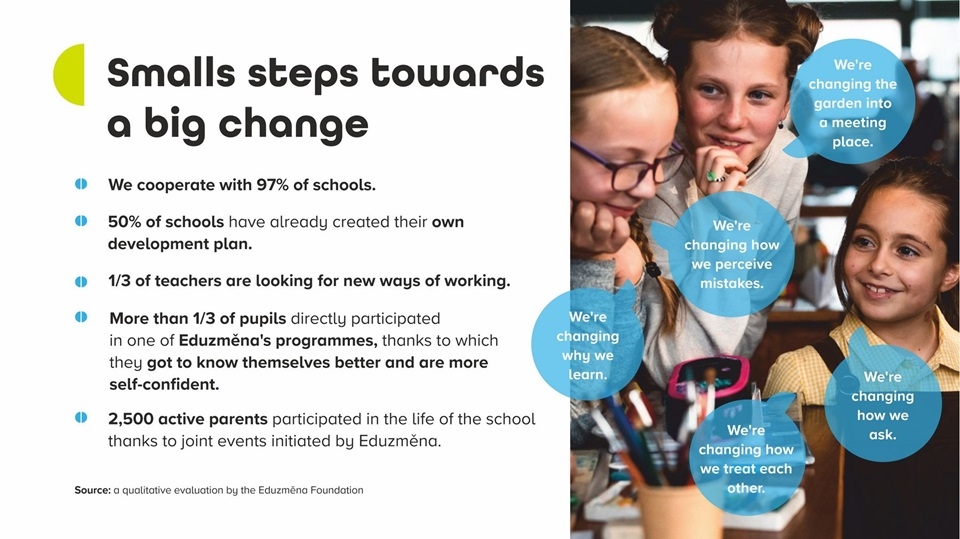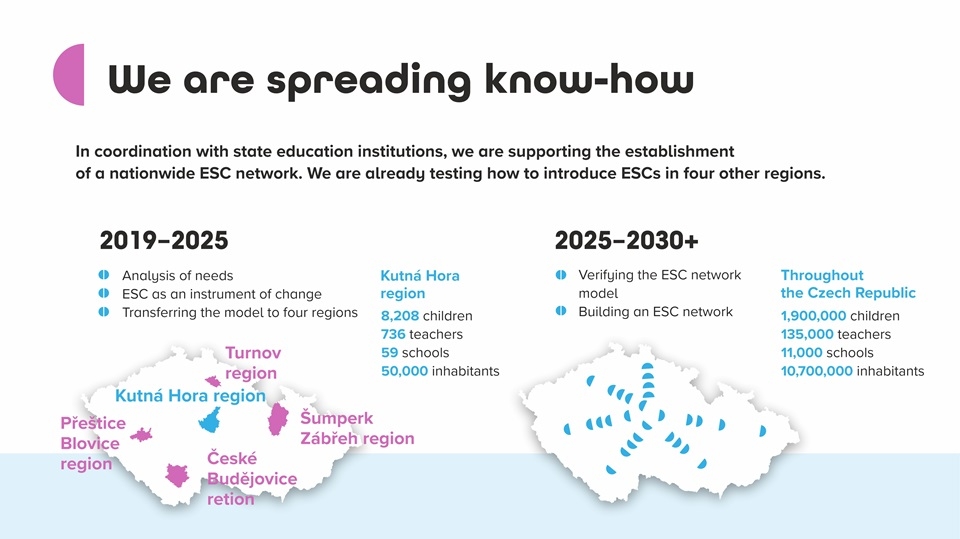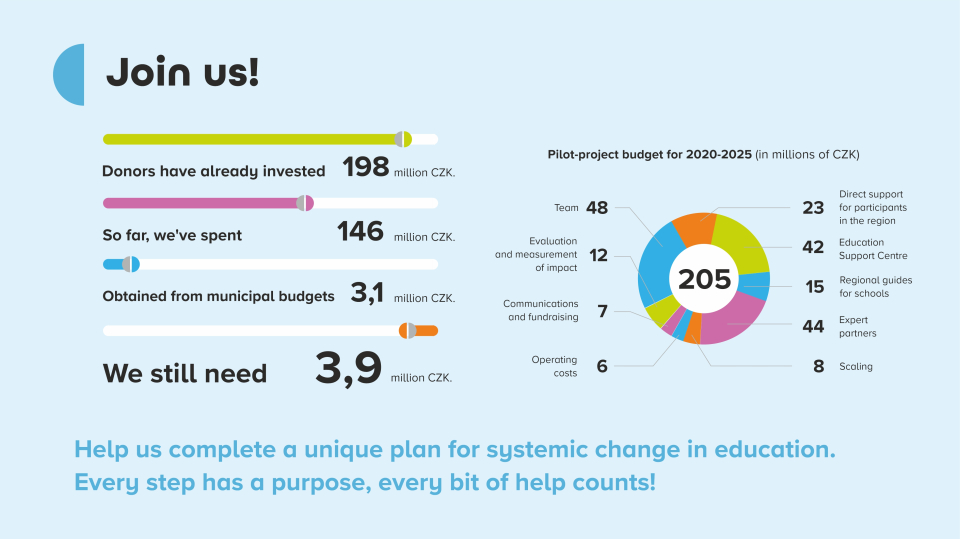School has an influence on what we achieve in life. It prepares us for living, develops our potential as well as our critical thinking and ability to cooperate. It helps us build relationships
and experience success.We want these kinds of schools for all our children. That's why we are working for change in the Czech Republic.
Zdeněk Slejška
director of Eduzměna endowment fund

Let's work together
to change how we teach
The pilot project of regional education support is already halfway through, and we now need to secure additional financing in order to bring it to a successful conclusion. Help us complete a unique plan for systemic change in education. Every step has a purpose, every bit of help counts!
Our answers to your most frequent questions
What is Eduzměna’s added value?
A number of schools, organizations, and individuals are doing interesting things in education, but so far no one has tried to bring them together, connect them and cooperate on beginning to develop the entire education system in a specific area. These often concern isolated activities; we take the route of involving and connecting all the participants. Our goal is systemic change. We bring together the experience and skills of a number of the parties involved and we work on the principle of scalability right from the start.
We use a logical and systematic work procedure that has also proven itself in business. We have carried out testing with a pilot project in the Kutná Hora region, where we collect feedback and compile best practices. At the same time, we pass on our tried-and-tested know-how and experience to other cooperating regions.
We focus on working with all target groups (teachers, principals, children, school founders, parents), because if we exclude one of them, it will not work as a unified whole. At the same time, we strive to ensure that all schools in the given region have access to what they need for their development.
We also work with the public sector. We are aware of its importance because it finances and determines the direction of Czech education. Representatives of public institutions are part of our board of administration and they participate in changes wherever needed.
We are supported by strong founders and other partners, thanks to whose trust we can be adaptable and are able to flexibly respond to the needs of the pilot project in the field. No one has yet found a way to make such a project financially sustainable. That’s precisely why we are striving to attain this by involving the public sector.
Why invest in education and its transformation when the state/public sector should be playing the main role. Will the state/public sector contribute financially?
We are working on creating a model of regional support for education. In the Kutná Hora region, we are testing how to support the development of all schools, and ascertaining which procedures and activities are working. We are evaluating their impact and we will offer proven ones to other regions. In our opinion, this is the role of the non-profit sector. Private sources allow us to seek things out, conduct trials, and even make mistakes. And in the pilot project, they provide us with a flexibility -- whether it be financial or procedural -- that the public sector cannot offer.
However, in order to propagate this model and to ensure the sustainability of the changes, it will be necessary to secure public funding, as no private resources would be sufficient for this. In this respect, we are already counting on the involvement of the public sector, which can support and stabilize the configuration of the system. That is why we are negotiating with school founders, municipalities, and regions, and are looking for a suitable method of multisource financing for regional support for schools.
How do you coordinate your plans with the state? How do you (actively) cooperate with the Education Ministry, other state institutions, and the public administration?
We bring together the private, non-profit, and public sectors. Representatives of the state and public administration work directly on our administrative and professional board. They include, for example, the chief school inspector, Tomáš Zatloukal, the deputy mayor of Liberec, Ivan Langer, and Jaromír Beran, deputy chief director of the education and youth section of the Education Ministry.
We consider it crucial that public institutions also take part in this systemic project and that they can use the expertise that is subsequently acquired. This is the only way a model of regional support for education can be sustainable and propagated further. Therefore, at the same time, we are actively looking for ways to connect our activities and the parallel projects of the Czech School Inspectorate, the National Pedagogical Institute, and the Ministry of Education itself in order to increase the positive impact on education.
We also cooperate with the state administration on a consultative level. For example, the director of the foundation, Zdeněk Slejška, is a member of the working group for the Education Ministry’s “middle layer”, which aims to help improve the quality of education through a comprehensive system of support for schools in pedagogical and non-pedagogical work. He also participates in a meeting of education experts with the Czech president and he is a member of the of the National Convention on Education (Národní konvent o vzdělávání), a professional discussion platform, which was established by the current education minister with a view to tackling the Czech school system in its entirety.
At the same time, we are also co-founders of the Partnership for Education 2030+ platform, which wants to contribute to the fulfilment of the Education Ministry’s Education Policy Strategy until 2030 and strives to improve children's learning and reduce inequalities in education.
How do you measure the impact of your activities? Success and failure?
Since the beginning of the pilot project, in cooperation with the external evaluator Schola Empirica, we have set up a quantitative evaluation, which monitors the impact of Eduzměna on selected student literacy skills.
Besides this, there is also an ongoing qualitative evaluation, which focuses on assessing specific Eduzměna activities (such as the Let’s Solve a Common Challenge (Řešíme společnou výzvu) and the Pedagogical leader (Pedagogický lídr) programmes. It also focuses on recording experiences as well as dead ends and good practices from the point of view of individual target groups (e.g. principals, teachers, lecturers). We therefore analyse what is happening in the region and what is (not) succeeding in the project from the point of view of individual parties involved and we also examine the internal mechanisms of Eduzměna. Qualitative research by its very nature cannot measure the impact of activities, but in individual analyses we identify what does (or doesn’t) work and formulate recommendations for the project’s future use, not only in the Kutná Hora region, but first and foremost for its use in processes for systemic change in other regions.
We use two data sources to identify partial successes and changes at the school level.
On the one hand, our guides supporting the development of schools write diaries where they record in detail everything essential that happens in schools, including interventions and their tone and impact. The second source for us consists of in-depth or group interviews with key players (principals, teachers, our target group coordinators, lecturers, and program participants), where they evaluate the progress, (failures) and impacts of specific activities from their point of view. Comprehensive analyses and recommendations are created from this data, and the foundation’s management, the coordinators of target groups, and people directly in the field work with this.
Thanks to the use of a triangulation method, i.e. the verification of individual outputs from multiple sources, we can consider our conclusions to be objective. The Eduzměna Foundation fulfils the principles of a learning organization thanks to continuous evaluation.
What happens after the pilot project ends?
At the end of the project, we will have a so-called model of regional support for education at our disposal, i.e. a set of activities, tools, measures, and principles, which will be verified by practice, thoroughly tested and evaluated. The basic precondition of the pilot project is the transferability of good practices and acquired experience, so we will subsequently offer this model to the public sector. Our ambition is to implement a regional support model for education on 20% of the territory of the Czech Republic by 2030. According to the innovation curve, this is precisely the tipping point when innovation takes hold permanently and becomes mainstream.
What will the success (failure) of Eduzměna look like?
We can immediately assess the success of Eduzměna on several levels. On the one hand, it is about being able to set up such support for schools in the given area and that they will be relieved of their burden, i.e. excessive administrative and operational demands will be eased. At the same time, it is necessary to advance the professional skills of teachers and establish effective interdisciplinary cooperation. Furthermore, it is essential that the created model is sustainable and can continue in its entire scope even after the end of our pilot scheme. The issue of funding is extremely important here. And ultimately it should lead to the improvement of children's learning and to everyone getting the same chance of a quality education.
What concrete benefits should Eduzměna have for schools, principals, and teachers?
Schools are overwhelmed by bureaucracy, and we are trying to create a support infrastructure for them that will provide them with relief (i.e. relief from excessive administrative and operational demands) and sufficient capacity to deal with educating children who have some type of disadvantage or, conversely, giftedness. Through regional school guides, we motivate schools to create their own development plan, which should bring them closer to the learning organization model.
Eduzměna shows principals how to create a vision that will bring others on board and how to create a safe space for learning. At the same time, we offer them support in pedagogical leadership – giving them the opportunity to participate in a long-term course using the support of a mentor or getting them to connect and share expertise with other directors in the region.
Eduzměna teaches teachers to develop students in a balanced way, to evaluate the effects of children's learning based on evidence, and to prepare and reflect on teaching together with colleagues. This is precisely what methodical centres built on collegial support and the sharing of good practices are for.
Do you draw on experiences form abroad? From where, what, and how?
In this respect, foreign projects like ours that work with a shared impact and build on the cooperation of several organizations with the aim of achieving a system-wide transformation or social change are of interest to us. In neighbouring Germany, for example, this concerns the RuhrFutur project, which addresses the quality of education and equal access for all children to quality education in the densely populated Ruhr region in North Rhine-Westphalia.
However, we did not find a project abroad that was identical to the Eduzména pilot scheme, probably also due to the diversity of educational systems. Nonetheless, we are inspired by the way they work with the so-called middle layers of educational support, which we are bringing to the Czech context as part of a pilot project in the Kutná Hora region. From this point of view, the Dutch model is interesting, whereby groups of schools have so-called "schoolboards" above them, and this helps relieve the burden on these institutions. As a result, principals have the opportunity to devote themselves purely to the pedagogical support of teachers. And we would like to show this to our colleagues from the Kutná Hora region during a planned trip to the Netherlands.
Together with other organizations in the autumn of 2023, we took part in a study trip to Estonia and Finland, i.e. countries that achieve better educational results and higher levels of children's well-being than in the Czech Republic. We shared the ideas we received from local schools and professional organizations with colleagues and the public.
Are you prepared for various political influences that could disrupt or abuse your plan?
We are building a regional support model for education in the regions so that it is as independent as possible from politics. Nonetheless, founders are a very important part of the work. That is also why we are trying to involve representatives across the political spectrum in our efforts, so that education becomes a priority for each group. At the same time, we are building our model on a partnership that also brings together representatives of the founders, the professional community, and parents. Thanks to this, a common consensus is created on regional education priorities, which have a chance of withstanding possible changes in policy at the municipal level.
If you have a question, please do not hesitate to contact us.
